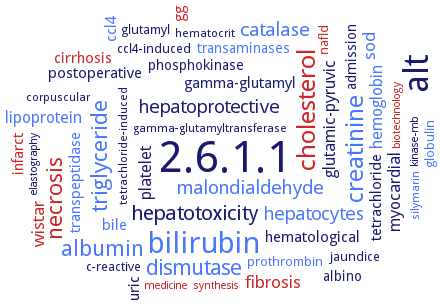2.6.1.1: aspartate transaminase
This is an abbreviated version!
For detailed information about aspartate transaminase, go to the full flat file.

Word Map on EC 2.6.1.1 
-
2.6.1.1
-
alt
-
bilirubin
-
cholesterol
-
creatinine
-
necrosis
-
albumin
-
triglyceride
-
dismutase
-
hepatotoxicity
-
malondialdehyde
-
catalase
-
hepatoprotective
-
hepatocytes
-
wistar
-
sod
-
fibrosis
-
hemoglobin
-
platelet
-
glutamic-pyruvic
-
myocardial
-
lipoprotein
-
postoperative
-
bile
-
hematological
-
transpeptidase
-
tetrachloride
-
ccl4
-
infarct
-
cirrhosis
-
gg
-
gamma-glutamyl
-
uric
-
admission
-
transaminases
-
phosphokinase
-
albino
-
jaundice
-
ccl4-induced
-
nafld
-
c-reactive
-
prothrombin
-
glutamyl
-
globulin
-
gamma-glutamyltransferase
-
corpuscular
-
tetrachloride-induced
-
silymarin
-
hematocrit
-
synthesis
-
kinase-mb
-
medicine
-
biotechnology
-
elastography
- 2.6.1.1
-
alt
- bilirubin
- cholesterol
- creatinine
- necrosis
- albumin
- triglyceride
- dismutase
-
hepatotoxicity
- malondialdehyde
- catalase
-
hepatoprotective
- hepatocytes
- wistar
- sod
- fibrosis
- hemoglobin
- platelet
-
glutamic-pyruvic
- myocardial
- lipoprotein
-
postoperative
- bile
-
hematological
- transpeptidase
-
tetrachloride
- ccl4
- infarct
- cirrhosis
- gg
-
gamma-glutamyl
-
uric
-
admission
- transaminases
-
phosphokinase
-
albino
-
jaundice
-
ccl4-induced
- nafld
-
c-reactive
- prothrombin
-
glutamyl
- globulin
- gamma-glutamyltransferase
-
corpuscular
-
tetrachloride-induced
- silymarin
-
hematocrit
- synthesis
-
kinase-mb
- medicine
- biotechnology
-
elastography
Reaction
Synonyms
2-oxoglutarate-glutamate aminotransferase, AAT, AAT-2, AAT-3, AAT3, aatA, AATase, aatB3, all2340, alr1039, alr2765, alr4853, aminotransferase, aspartate, aoa/coa, AsAT, Asp AT, aspartate alpha-ketoglutarate transaminase, aspartate aminotransferase, aspartate aminotransferase 1, aspartate aminotransferase A, aspartate AT, aspartate transaminase, aspartate, 2-oxoglutarate aminotransferase, aspartate-2-oxoglutarate transaminase, aspartate/(R)-cysteate:2-oxoglutarate aminotransferase, aspartate/tyrosine/phenylalanine pyridoxal-5'-phosphate-dependent aminotransferase, aspartate:2-oxoglutarate amino-transferase, aspartate:2-oxoglutarate aminotransferase, aspartic acid aminotransferase, aspartic aminotransferase, aspartyl aminotransferase, AspAT, AspATSs, aspB, aspC, AspT, AST, AST-Bb, AtPAT, bifunctional aspartate aminotransferase and glutamate/aspartate-prephenate aminotransferase, C-S lyase, CAA1, cAST, Cgl0240, class Ibeta AAT, EcAspAT, GL50803_91056, glutamate oxaloacetate transaminase, glutamate oxaloacetate transaminase 1, glutamate-oxalacetate aminotransferase, glutamate-oxalate transaminase, glutamate-oxaloacetate transaminase 1, glutamic oxalic transaminase, glutamic oxaloacetic transaminase, glutamic-aspartic aminotransferase, glutamic-aspartic transaminase, glutamic-oxalacetic transaminase, glutamic-oxaloacetic transaminase, GOT, GOT (enzyme), GOT1, GOT1L1, GOT2, KAT IV, L-aspartate aminotransferase, L-aspartate transaminase, L-aspartate-2-ketoglutarate aminotransferase, L-aspartate-2-oxoglutarate aminotransferase, L-aspartate-2-oxoglutarate-transaminase, L-aspartate-alpha-ketoglutarate transaminase, L-aspartate:2-oxoglutarate aminotransferase, L-aspartateartate aminotransferase, L-aspartic aminotransferase, L-AspAT, mitAAT, More, oxaloacetate transferase, oxaloacetate-aspartate aminotransferase, Pat, PfAspAT, plastid aspartate aminotransferase, prephenate aminotransferase, protein TT0402, PT-AAT, Rv3722c, Sar2028, SsAspAT, Tb11.02.2740, transaminase A


 results (
results ( results (
results ( top
top





